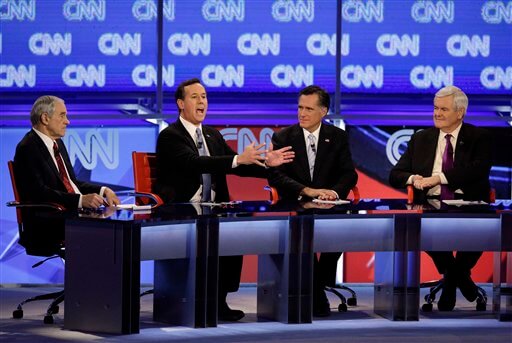
Romney? Gingrich? Santorum? The Republican race for the presidential nomination is like a game of musical chairs. It makes you wonder what’s going on in the heads of voters as they cast their primary ballots.
But give them a break. Choosing a candidate in a party primary is fundamentally more complicated than in a general election, experts say.
Scholarly research into how voters choose a candidate in primaries is limited, compared with studies of voter behavior in the general election. But as major contests loom in Arizona and Michigan on Tuesday, with Super Tuesday following on March 6, experts agree that voting in primaries is a challenging task.
For starters, you can’t simply vote your party. “People use party as a cue extensively in voting,” says political scientist David Redlawsk of Rutgers University. It’s “the simplest piece of information we normally have. … Not having that party cue really makes it much more difficult for voters,” including independents.
Other complications:
—There are more candidates to consider than just the two leading nominees in November.
—Voters know less about primary candidates than they’ll hear later on about the eventual nominees.
—There are generally fewer differences among those candidates than a voter will see between a Republican and Democrat. People who spend a lot of time studying the policy differences “might in fact find themselves more confused than better informed,” Redlawsk says.
As his Rutgers colleague Richard Lau sums up in an analysis of the 2008 nominating process, “Voting in primary elections is downright hard.”
In fact, Lau’s research concludes that voters in primaries and caucuses often do barely better than chance in choosing the candidate who best represents their own values and priorities. (He says voters do far better when the general election rolls around.)
Plenty of party members just stay home; turnout is usually lower than in the general election. That leaves the task to those who are the most interested in politics and their own party.
So what makes a primary voter choose one candidate over the others? Lau says that has proved hard to pin down, but others have some ideas.
Samuel Popkin of the University of California, San Diego, author of a forthcoming book about presidential politics called “The Candidate,” says primary voters often face conflicting goals.
“One of the things we know is that there’s a constant tension all the time between the ideal and the practical,” he said. “You want somebody who’s pure and clean and ideal, yet somebody who knows how to wade through the swamp and clean up Washington.
“You want two things that are somewhat incompatible,” said Popkin.
Voters want somebody who agrees with them on the issues they care about, although as candidates introduce themselves they need not be very specific about what they’d do if elected, notes Arthur Lupia of the University of Michigan. Voters can get worked up about a bad economy if they see it in their own lives and they hear the government is responsible for wider economic troubles, he said.
And voters also ponder who can win in November. That and the issues were on the mind of Matthew Coker, 20, a political science major at the University of Memphis who cast his first vote ever in a presidential primary the other day. His ballot, filled out in early voting in Tennessee, went for Mitt Romney.
“I want a president that understands economic freedom and understands that the market is best left alone by the government,” said Coker. And as for electability, he said he thought Romney would connect with crucial moderate voters better than Rick Santorum or Newt Gingrich because of “the leadership he demonstrated as a conservative Republican governor of a Northeastern blue state, Massachusetts.”
Voters care about leadership, trustworthiness, compassion and intelligence, although being too intellectual can hurt a candidate, says political science professor Jon Krosnick of Stanford University. They get hints about that from watching televised debates and campaign events, he said.
In fact, debates have become more influential as their number increases and clips show up on YouTube, he said. Some of their punch comes from news media conclusions that a certain candidate performed strongly or weakly, judgments that can sway voters without a strong preference, said John Geer of Vanderbilt University.
Similarly, a poorly known candidate can pick up support by winning primaries, because that attracts news coverage, usually positive, Geer said.
The news coverage played a role for Mark Fratella, a 34-year-old algebra teacher in Chicago. At various times he favored Romney and Gingrich, but finally settled on Santorum for the upcoming Illinois primary.
“My wavering at the beginning seemed to go with whoever was the front-runner at the time, just because of the coverage,” Fratella said. The media attention finally prodded him to focus on Santorum, and what he found “resonates with me.”
Candidates are also helped by endorsements from iconic organizations that voters trust — a “huge” help in a race that lacks party labels, Lupia said.
So as all this information flows in, how does a voter weigh it and come to a decision? It’s a mix of the conscious and unconscious, gut feeling and rational consideration.
Experts debate whether voters consciously know why they voted for one candidate over another, Redlawsk said. One school of thought suggests voters combine information about each candidate in sort of a mental ledger to produce an overall impression, he said, but once that’s done, they forget the specific information that influenced them.
“We take into account a lot more information than we can report back later when we’re asked,” he said.
In any case, many experts say that for all the challenges, primary voters do a fairly good job of choosing.
Although Lau’s study suggests their votes don’t always go to the “right” candidate, even a “wrong” candidate is probably not very different, Redlawsk says.
Popkin calls the primary system “amazing,” a process that weeds out “Johnny-one-notes” and lightweights.
“I think it works better than people realize.”
___
Malcolm Ritter can be followed at http://www.twitter.com/malcolmritter
Copyright 2012 The Associated Press.


































